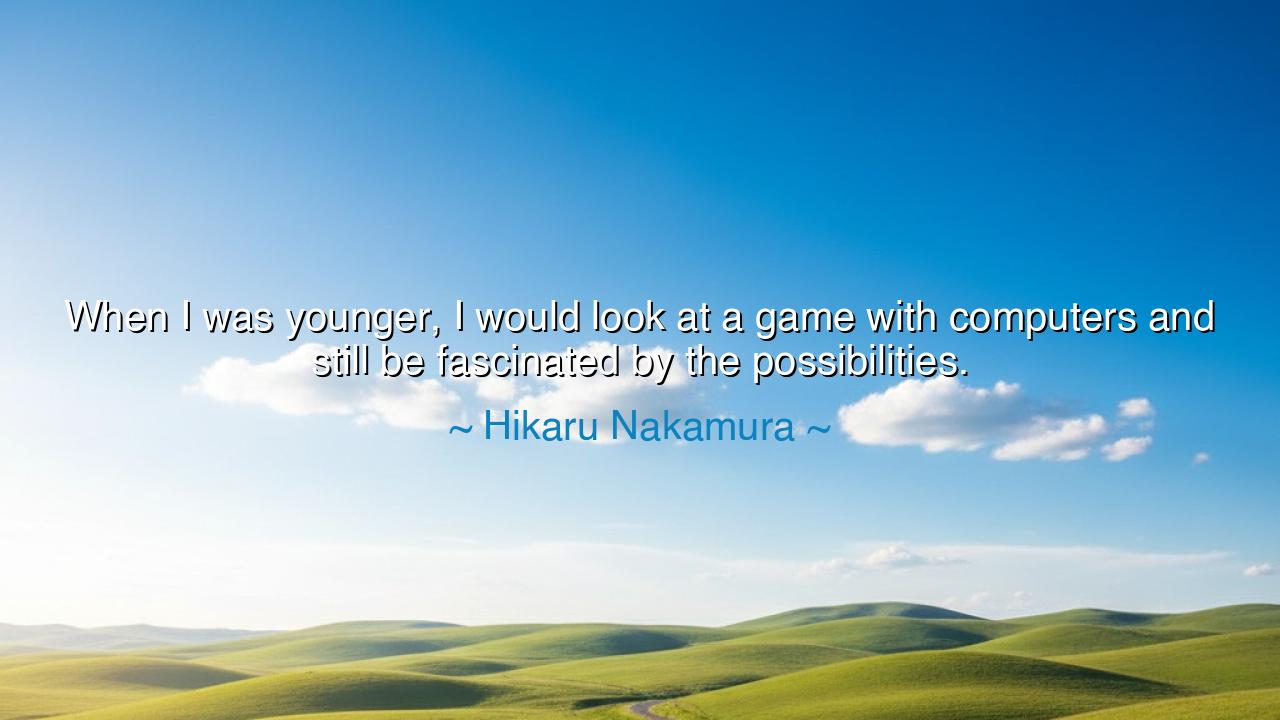
When I was younger, I would look at a game with computers and
When I was younger, I would look at a game with computers and still be fascinated by the possibilities.






The words of Hikaru Nakamura — “When I was younger, I would look at a game with computers and still be fascinated by the possibilities.” — carry a quiet wonder that transcends the boundaries of chess, reaching into the heart of human curiosity itself. Beneath their simplicity lies an eternal truth: that the spirit of discovery begins in fascination — in the moment when the mind glimpses something vast, mysterious, and filled with potential. Nakamura, one of the greatest chess players of his generation, speaks not only of a child’s awe before a machine, but of the meeting between human intellect and artificial creation, between the instinct of the artist and the precision of the algorithm.
In the ancient way of teaching, the wise often said that wonder is the mother of wisdom. For it is not knowing that gives birth to knowledge, but questioning. Nakamura’s words reflect this sacred beginning. As a boy, he did not see the computer as a rival or tool alone, but as a mirror of infinite possibility — a portal to a world where strategy, logic, and creativity could intertwine. His fascination reveals the eternal law of progress: that every advance of civilization begins not in mastery, but in curiosity — the spark that makes man gaze upon what he does not yet understand and whisper, “What if?”
The origin of his insight lies in the evolution of chess itself — the oldest war of minds reborn in the digital age. Once played on carved wood under candlelight, it now thrives across glowing screens. Nakamura, who rose to prominence in both traditional and online chess, witnessed how machines began to reshape the game — first as opponents, then as teachers, and finally as partners. Where others saw computers as the end of human dominance, he saw a new horizon of growth. The machine could calculate deeper, yes — but it could also challenge the human imagination to evolve, to see patterns and possibilities that once lay beyond reach.
History echoes this harmony of man and machine. When Galileo first turned his telescope toward the heavens, he too was entranced not by conquest, but by possibility. The stars had always been there, yet through his lens, they became personal — a dialogue between the human eye and the infinite. So it is with Nakamura’s fascination: the computer was not an end, but an opening — a modern telescope pointed inward, toward the boundless cosmos of the human mind. Technology, when embraced with curiosity rather than fear, becomes the vessel of enlightenment.
There is also humility in his words, a recognition that greatness begins in wonder, not arrogance. To be “fascinated by possibilities” is to remain a student of the world, even at the height of mastery. In this, Nakamura embodies the spirit of the ancients — the philosophers who taught that the wise man is he who never ceases to learn. The child who once stared at a chess program with awe is the same man who, even now, finds beauty in the dance between calculation and intuition. Fascination is the fountain that never runs dry for those who keep their hearts open to learning.
His reflection also carries a deeper moral: that the relationship between humanity and its creations must be one of partnership, not pride. The ancients feared that man might become enslaved by his own inventions — that the tools meant to serve would one day rule. But Nakamura’s tone is not one of fear; it is of reverence. He reminds us that machines, like chessboards, are lifeless without the human touch. It is our imagination that gives them meaning. Technology without humanity is empty; humanity without curiosity is stagnant. Only together can they create something enduring.
So, my children, take this wisdom to heart: never lose your fascination with the possible. Whatever tools you wield — whether pen, brush, or computer — use them not as crutches, but as companions in creation. Approach the unknown not with dread, but with delight. For fascination is the spark of all genius, and the beginning of every great discovery. Guard it well, nurture it daily, and let it lead you into deeper understanding.
And thus, Hikaru Nakamura’s words endure not merely as a reflection on chess or technology, but as a hymn to the eternal dialogue between man and the infinite. For when we gaze upon the creations of our age and see not limitations, but possibilities, we walk in the footsteps of every seeker who ever dared to dream — from the first stargazer to the modern innovator — bound together by the same undying curiosity that makes us human.






AAdministratorAdministrator
Welcome, honored guests. Please leave a comment, we will respond soon